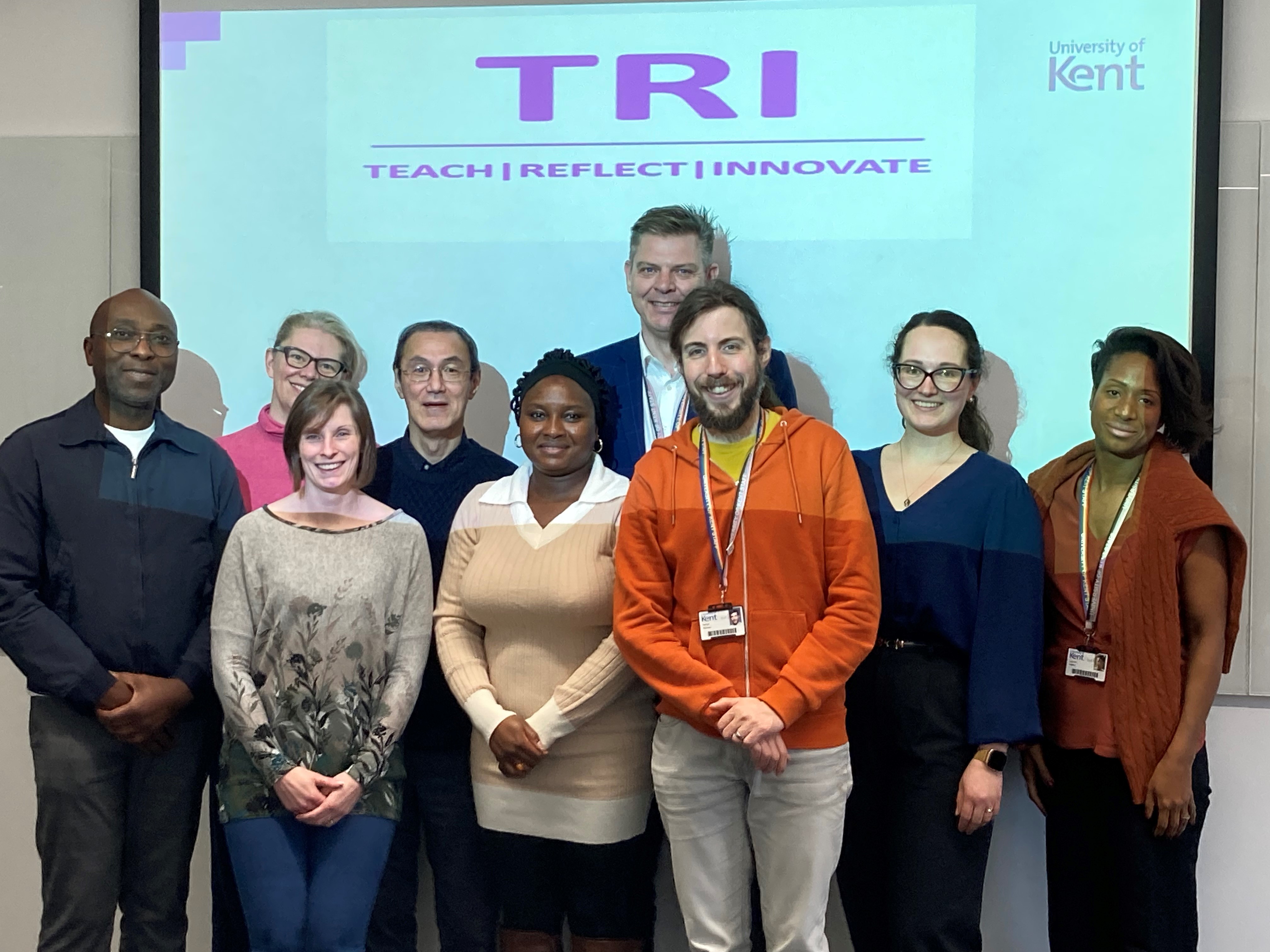Photo:
Front row L-R: Dr Alexandra Moores, Dr Yetunde Kolajo, Dr Manuel Marques,
Back row L-R: Dr Aaron Berko, Dr Kyra de Coninck, Tuan Yu, Professor Dan Lloyd, Dr Aiste Steponenaite, Saundré Hughes
The Teach Reflect Innovate (TRI) Programme has gained momentum in supporting academic staff across two divisions namely Natural Sciences (NATS) and Computing Engineering and Mathematical Sciences (CEMS), with a Reflective Teaching Workshop for Human and Social Sciences (HSS) scheduled for the 21st of February 2024.
TRI was launched in November 2023 with NATS and was distinguished by the Reflective Teaching Workshop facilitation of Professor Ijeoma Uchegbu from UCL, an esteemed authority in Pharmaceutical Nanoscience. Her presentation, entitled “Moving the Needle on Equity, Diversity, and Inclusion,” set a precedent for the level of discourse and insight the programme aims to cultivate.
Since the programme’s inception, the NATS academic cohort engaged with TRI has convened for two “coffee catch-ups” – essentially mini-workshops designed to encourage educators to critically evaluate their pedagogical approaches. These sessions, led by Dr Yetunde Kolajo and Dr Aaron Berko from the School of Chemistry, have provided a platform for reflective practice, particularly in relation to the integration of inclusive teaching and interpretation of data into teaching methodologies. The most recent of these gatherings was notably data-driven, focusing on both divisional and school-level statistics to foster discussions around demographic trends and the potential adjustments to teaching resources and strategies that such insights necessitate.
Looking forward, the next session for the NATS division is poised to address the critical theme of ‘Decolonising and Diversifying the Higher Education Curriculum,‘ with facilitation by Lucy Panesar from the Centre for the Study of Higher Education (CSHE). Concurrently, the CEMS division initiated its participation in the TRI Programme with a keynote by Dr Rehan Shah, an Assistant Professor of Mathematics at Queen Mary University London, who provocatively examined the themes of inclusivity and ethics through his talk titled “Teaching Ethics and Sustainability in Mathematics? You Must be Joking!” This reflects the programme’s broader commitment to challenging conventional pedagogical norms and fostering a more inclusive, reflective, and innovative academic environment.
HSS TRI Reflective Teaching workshop will be hosting Dr Avi Ben-Zeev, Senior lecturer in psychology from London Metropolitan University who will be focusing on ‘I Belong, Therefore I Am: Evidence-Based Teaching Tools that Protect Against Social Identity Threat and Promote Thriving’. In this one-hour interactive workshop, participants will learn to (a) identify educational contexts that inadvertently give rise to a lack of belonging and social identity threat and (b) apply evidence-based tools to combat these effects and promote student thriving. The latter include brief but effective interventions, such as Values Affirmation and Social Belonging and ‘Speaking Truth’.
TRI is privileged to have a small group of NATS academics who are continuously engaged with the programme. The excellent engagement on the Teams channel shows that there is an appetite for a community of academic practice. There is a dedicated Reflective Teaching TRI Moodle page that’s open to all for more information here. Support from the Student Success team, including strategic commitment from Saundré Hughes, has aided in the planning and implementation of TRI. The TRI 2023/24 NATS cohort includes Professor Dan Lloyd, Dr Kyra De Coninck, Dr Alexandra Moores, Dr Manuel Marques, Dr Aiste Steponenaite, Tuan Yu and Dr Rosalyn Masterton.
Reflective Teaching Workshops have elicited a range of responses from the academic staff, highlighting their transformative potential in pedagogical practices. Preliminary analyses suggest a notable enhancement in the educators’ ability to critically evaluate their teaching methodologies, fostering a culture of continuous improvement and reflective practice within the academic environment. Participants have reported an increased awareness of diverse teaching strategies, a deeper understanding of student learning needs, and a strengthened commitment to pedagogical excellence. Furthermore, the workshops appear to have facilitated the development of a supportive community of practice among faculty members, encouraging the exchange of innovative teaching approaches and collaborative reflection. These outcomes underscore the significance of the TRI Workshops in promoting a reflective, evidence-based approach to teaching that can significantly contribute to the advancement of educational quality in higher education institution.
Here are some of the direct quotes received:
‘Learned about practical tools and resources to apply to my teaching practice’
‘Engaged in discussion with colleagues around Best Practice in Teaching’
Participants’ one takeaway:
‘How to become more approachable in sessions, and to boost engagement’
‘Potential to identify useful data sets to support colleagues in considering modules, assessment, performance, etc.’
The Reflective Teaching Workshops and coffee catch-up sessions have been avenues through which academics gain insight into sharing new ways of working. TRI can play a pivotal tool within the EM25 process by providing academic staff with simplified questions that trigger thinking around key areas of inclusive teaching, such as inclusive curriculum design, choice of assessment, improved feedback system, use of demographic data to inform practice, lecture structure, lecture slides, and lecturer-student lecture interactions. We are excited about TRI and plans for other divisions coming on board. If you would like to get involved contact studentsuccessproject@kent.ac.uk or y.kolajo@kent.ac.uk

